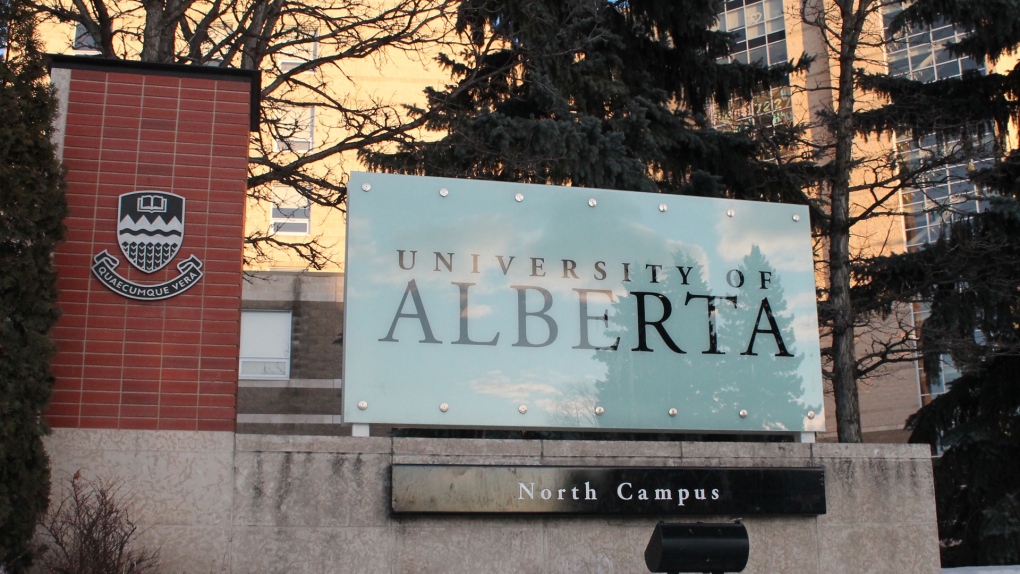'Recruit from us': Agreement between Alberta First Nations, U of A aims to train more Indigenous physicians
 University of Alberta North Campus. (Sean McClune/CTV News Edmonton)
University of Alberta North Campus. (Sean McClune/CTV News Edmonton)
A new agreement between the University of Alberta and Tribal Chiefs Ventures Inc. aims to train more Indigenous physicians and improve health care for northern Alberta First Nations.
During a ceremony on Wednesday, six northeastern Alberta First Nations signed a memorandum to formally recognize a joint partnership to begin local recruitment with the U of A.
Those six nations represented Include: Beaver Lake Cree Nation, Cold Lake First Nation, Frog Lake First Nation, Heart Lake First Nation, Kehewin Cree Nation, and Whitefish Lake First Nation No. 128.
“I am excited about this memorandum of relational understanding and the potential it has to promote learning opportunities in the sciences and medical fields for the youth,” Cameron Alexis, the chief executive officer of Tribal Chiefs Ventures Inc., explained.
“It allows us to drill down to the nations upon successful completion of Grade 12 that this kind of career path is not impossible. It is possible.”
“A key part of our faculty’s mission is to serve the public through partnerships and innovation, on a solid foundation of social accountability,” Brenda Hemmelgarn, dean of the Faculty of Medicine & Dentistry, added.
Unlike a traditional memorandum, the newly signed agreement focuses on gaining trust in the nations while supporting working relationships that will lead to success.
“When we respect Indigenous world views and find ways to work together, we will achieve harmony and build trusting partnerships to reach our shared goals,” Wayne Clark, the executive director of the U of A's Indigenous Health Initiatives program, said.
According to Clark, progress is expected in the recruitment of more Indigenous medical school applicants including First Nations, Inuit and Métis, as well as urban and non-status students.
The second target area is to improve all trainee physicians' understanding of challenges First Nations peoples face within the healthcare system. The third focus Clark said is finding innovative and educational solutions to healthcare gaps with Indigenous peoples.
“There is a need for Indigenous medical practitioners — physicians, psychologists, psychiatrists, nurse practitioners, RNs, dentists and others — to help address the needs of First Nations peoples,” Alexis said.
“We should be helping out to look after our own nations, but not only our own nations but also fellow Albertans and fellow communities that are in Alberta so although this is a stepping stone to help our nation's it’s also to help other Canadians.”
“Historically looking at the data, the people we do recruit from the communities and train in those communities are more likely to go back and practice in those communities,” Hemmelgarn added.
“It’s not just about bringing them in and training them to be a doctor, it's recruiting them from their home communities, it’s supporting them while they’re here and then it’s helping them actually transition back to practice in the various communities where they’re located.”
Clark said this agreement is the first of its kind. Noting it's a step toward achieving the 94 Calls to Action of the Truth and Reconciliation Commision of Canada.
“We the people of the First Nations we’re here,” Alexis added. “Recruit from us.”
CTVNews.ca Top Stories

Donald Trump says he urged Wayne Gretzky to run for prime minister in Christmas visit
U.S. president-elect Donald Trump says he told Canadian hockey legend Wayne Gretzky he should run for prime minister during a Christmas visit but adds that the athlete declined interest in politics.
Historical mysteries solved by science in 2024
This year, scientists were able to pull back the curtain on mysteries surrounding figures across history, both known and unknown, to reveal more about their unique stories.
King Charles III focuses Christmas message on healthcare workers in year marked by royal illnesses
King Charles III used his annual Christmas message Wednesday to hail the selflessness of those who have cared for him and the Princess of Wales this year, after both were diagnosed with cancer.
Mother-daughter duo pursuing university dreams at the same time
For one University of Windsor student, what is typically a chance to gain independence from her parents has become a chance to spend more time with her biggest cheerleader — her mom.
Thousands without power on Christmas as winds, rain continue in B.C. coastal areas
Thousands of people in British Columbia are without power on Christmas Day as ongoing rainfall and strong winds collapse power lines, disrupt travel and toss around holiday decorations.
Ho! Ho! HOLY that's cold! Montreal boogie boarder in Santa suit hits St. Lawrence waters
Montreal body surfer Carlos Hebert-Plante boogie boards all year round, and donned a Santa Claus suit to hit the water on Christmas Day in -14 degree Celsius weather.
Canadian activist accuses Hong Kong of meddling, but is proud of reward for arrest
A Vancouver-based activist is accusing Hong Kong authorities of meddling in Canada’s internal affairs after police in the Chinese territory issued a warrant for his arrest.
New York taxi driver hits 6 pedestrians, 3 taken to hospital, police say
A taxicab hit six pedestrians in midtown Manhattan on Wednesday, police said, with three people — including a 9-year-old boy — transported to hospitals for their injuries.
Azerbaijani airliner crashes in Kazakhstan, killing 38 with 29 survivors, officials say
An Azerbaijani airliner with 67 people onboard crashed Wednesday near the Kazakhstani city of Aktau, killing 38 people and leaving 29 survivors, a Kazakh official said.






























